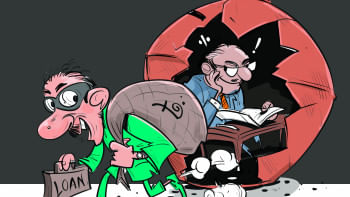Can a bureaucrat-reliant ACC really be independent?

The Anti-Corruption Commission (ACC) was established with the vision of an independent institution with a specific legal mandate, based on the ACC Act of 2004, to effectively control and prevent corruption in Bangladesh. No law is perfect, nor is any institutional capacity ideal. Nevertheless, based on fairly close engagement with it since the early days of its establishment, and drawing upon successive research conducted over the years, it can be reasonably concluded that its legal and institutional structure provides the potential to deliver anti-corruption in Bangladesh with moderate success.
The reality, however, is quite different. There has always been a wide gap between the commission's potential and delivery, which can be attributed to a twin challenge faced from a very early stage. One, an endemic deficit of courage and commitment to deliver the mandate without fear or favour, and two, a long-nourished stranglehold of bureaucratic control.
The rationale behind creating the ACC – replacing the former Bureau of Anti-Corruption (BAC), which used to be attached to the office of the head of the government – were the exact same factors of lack of operational independence and bureaucratic control.
However, the ACC started out as "old wine in new bottle" thanks to the absorption of almost all of the BAC staff into the commission, carrying the baggage of BAC's organisational culture and practices. Whereas, it was hoped that it would be run by fresh blood under the executive authority of commissioners, headed by a chair who would be appointed based on a proven track record of professional and personal excellence, integrity, courage and commitment, free from partisan or bureaucratic influence.
Under successive regimes, everything necessary was done to maintain bureaucratic control through deputed officials at the senior management level and appointment of commissioners on the basis of partisan political choice. While governments have often treated it as part of themselves, the ACC itself has also operated largely as a government agency. Both have ignored the fact that, although set up by the government, the ACC's main job is to hold the government and its officials to account in case of allegations of corruption.
The ACC and the government have even been on common ground when it comes to curtailing the ACC's operational independence, especially with regard to investigating public officials alleged of corruption. The ACC, for instance, found no problem in the repeated attempts, as under the Public Service Act 2018, to create obligations for the ACC to seek prior government approval before taking into custody public officials for corruption investigations. This is despite the fact that this has been strongly protested by civil society, on the grounds that it is contradictory to the constitutional provision of equality of all before law.

Against this backdrop, an office order on the delegation of administrative and financial authority, issued on January 18, 2022, has sweepingly assigned to the commission Secretary – who is part of the government bureaucracy – some key elements of the ACC's executive power. This includes postings and transfers of commission-recruited investigation officers at deputy and assistant director levels.
Moreover, a wide range of other related critical terms and conditions, like permanence and regularisation of appointment, assignment of current duties, service benefits, leave, pensions, post-retirement leave, performance-based awards, etc, will now be controlled by government bureaucracy, represented by the Secretary. In addition, the order includes a provision (chha/4) that transfers all powers of implementing section 16 of the ACC Act to the Secretary, which practically invalidates section 3(2) of the Act, which stipulates that the ACC is an independent and impartial organisation.
This set of decisions, if enforced, may be the final nail in the coffin of any prospect of independent and operational flexibility in investigations, the core function of the ACC. The law provides executive authority to the Chair and other Commissioners who function under the Chair's leadership. But now, this executive authority has been transferred from the Commission to the Secretary.
The secretary and most other senior officials of the ACC are deputed from the bureaucracy, who will now control its entire range of administrative and financial operations, including the investigation process. Even though they serve the ACC for the period of deputation, barring perhaps rare exceptions, their operational practices, allegiance and decisions are most likely to be plagued by conflict of interest and bias towards bureaucracy, which is against the letter and spirit of the vision and mission of the commission.
The question is, on what basis, process and logic did this delegation of authority take place? Did the commission consider lessons learnt over the years? Or, has it been driven by the recent extraordinary experience around the debatable removal of an investigation officer, who took the challenge of delivering his duly entrusted task of conducting dozens of investigations against some powerful syndicates of grand corruption in Chattogram and Cox's Bazar, which included politically influential individuals, public representatives and officials?
The dismissal not only deepened concerns over the commission's decision-making being influenced by vested interests related to status and identity of relevant individuals, but also forced the investigation officials to resort to unprecedented moves, including organising a human chain to ensure job security.
If the move was prompted by this exposure of the ACC's internal governance deficits, including tensions between two categories of officials, deputed bureaucrats and investigation officials, it can only contribute to further tensions and more bureaucratic control undermining the authority of the chair and other commissioners.
The explanation provided as justification – that it is meant to follow the same model of delegation of authority as practiced in government offices – is a perfect example of denial of the vision of the ACC as an independent body outside government influence, and not a government institution. The prospect of its independence has visibly become so hostage to the bureaucratic stronghold, that the commission appears to have allowed itself to transform into the long-abandoned BAC model.
The office order of January 18 must be withdrawn without delay. The commission needs to demonstrate the courage and commitment to prevent itself from being shot in the foot.
Iftekharuzzaman is Executive Director of Transparency International, Bangladesh.

 For all latest news, follow The Daily Star's Google News channel.
For all latest news, follow The Daily Star's Google News channel. 











Comments